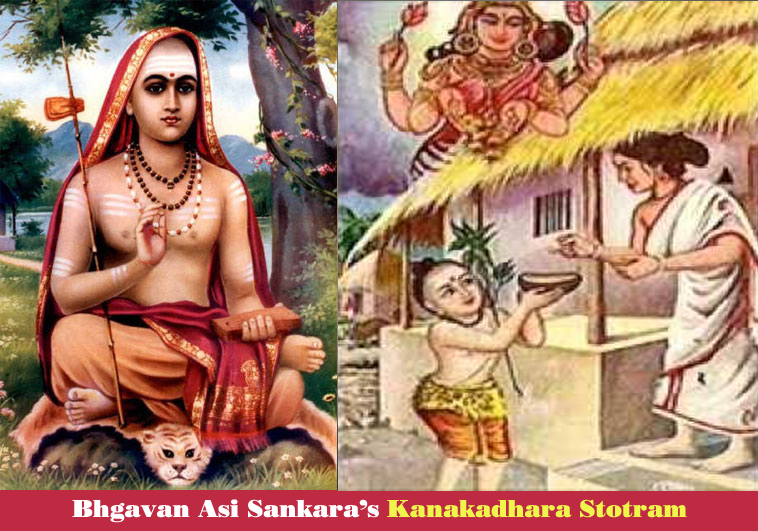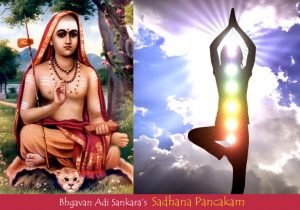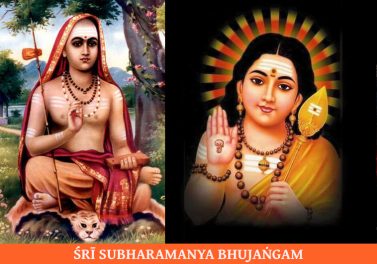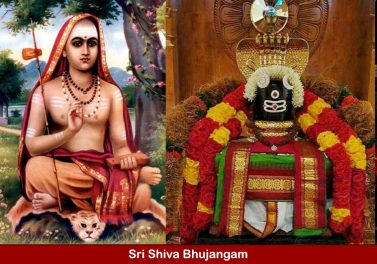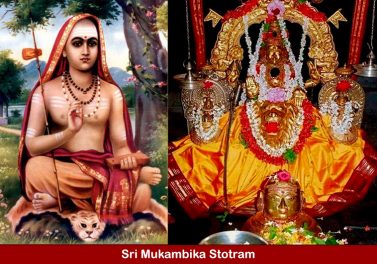अमुया कण्ठस्थितया प्रश्नोत्तररत्नमालिकया ॥ १॥
amuyā kaṇṭhasthitayā praśnottararatnamālikayā ॥1॥
Who is the able person for realizing what is good in this world and those unseen that he cannot find in praśnottararatnamālika, the necklace of gems made-up of questions and answers on the most profound knowledge, as the most fitting ornament to adore the neck, the source of his voice! (By mastering the lessons here, one attains the good for life here and hereafter).
को गुरुः अधिगततत्त्वः शिष्यहितायोद्यतः सततं ॥ २॥
ko guruḥ adhigatatattvaḥ śiṣyahitāyodyataḥ satataṃ ॥ 2॥
(1)What deserves total acceptance? The words of the Guru! (If so)
(2)What is to be rejected? That which is declared to be avoided (as evil) must be rejected.
(3)Who is the Guru? He who has attained the Self-realization and forever thinks for the best for his disciples is the Guru.
किं मोक्षतरोर्बीजं सम्यक्ज्ञानं क्रियासिद्धं ॥ ३॥
kiṃ mokṣatarorbījaṃ samyakjñānaṃ kriyāsiddhaṃ ॥ 3॥
(Under the guidance of the Guru)
(4) What is the foremost task for the Learned? It is to attain the means for terminating the vicious cycle of birth and death. (For such accomplishment)
(5) What is the seed (essential) of the tree of liberation? The seed of liberation is in the acquisition of perfect knowledge and its strict adherence in life.
कः पण्डितो विवेकी किं विषमवधीरणा गुरुषु ॥ ४॥
kaḥ paṇḍito vivekī kiṃ viṣamavadhīraṇā guruṣu ॥ 4॥
(For the perfect knowledge)
(6) What is the right approach? The right approach is to follow Dharma or the righteousness (as shown by those who are pure and intelligent).
(7) Who is the person of purity? One with unblemished mind is pure.
(8) Who is truly intelligent? One who uses the discriminating intellect is truly intelligent. (But the purity of mind and the discriminating intellect are eluded as if by a venom).
(9) What is the venom? The act of ignoring the spiritual instructions of the Guru is the venom (leading to one’s downfall).
किं मनुजेष्विष्टतमं स्वपरहितायोद्यतं जन्म ॥ ५॥
kiṃ manujeṣviṣṭatamaṃ svaparahitāyodyataṃ janma ॥ 5॥
(Guided by the wise words of Guru)
(10) What is the true understanding from the study of life (and death)? It is the understanding that life is transitory. (If so)
(11) What should be the goal of life? It is to dedicate life for the good of one and all.
का भववल्लि तृष्णा को वैरी यस्त्वनुद्योगः ॥ ६॥
kā bhavavalli tṛṣṇā ko vairī yastvanudyogaḥ ॥ 6॥
(But the fickle nature of mind makes difficult to follow the righteous path).
(12) What makes the mind to vacillate as if under the influence of intoxication? It is due to the attachment to the sensory pleasures, the mind is said to be lost.
(13) Who are the thieves (of the mind)? The sense objects are the thieves (as the desires on objects steer the mind away from the act of Self-realization to mere sensory indulgence; such indulgence binds the Jiva like a creeper).
(14) What is the nature of such creeper (that binds the mind into the cycle of birth and death)? Never-ending thirst of desires or kama is its nature. (Entangled with the creeper is like being defeated in life).
(15) Who is the enemy (causing such defeat against the worldly-desires)? The enemy is the sluggishness or inertia that results in the non-performance of one’s rightful duties.
कः शूरो यो ललनालोचनबाणैर्न च व्यधितः ॥ ७॥
kaḥ śūro yo lalanālocanabāṇairna ca vyadhitaḥ ॥ 7॥
(16) What is the source of fear for all? Death is fearful to all. (Although death is the only certainty in life, many are blind to see the truth). (17) Who is the most blind among the blind? He who is overtaken by worldly attachments is the most blind. (To overcome the fear of death and the blinding-desires one must be brave). (18) Who is brave? He who is infallible to the arrow-like eyes of damsel (in other words, who is unattached to all sort of vain indulgence) is brave. (Such bravery is only possible when righteous path is pursued).
किं गुरुताया मूलं यदेतदप्रार्थनं नाम ॥ ८॥
kiṃ gurutāyā mūlaṃ yadetadaprārthanaṃ nāma ॥ 8॥
(To focus on the righteous path, all sensory input must be carefully chosen). (19) What should be heard well by the ears? The instruction of the spiritual Guru should be heard by the ears. (By such instructions, one gains confidence and achieve self-respect). (20) What makes one respectable? Respectability is achieved only through righteous character and not in seeking (any other) favours from any. (The knowledge to righteous path is the true gift to be known).
किं दुःखं असन्तोषः किं लाघवमधमतो याच्ञा ॥ ९॥
kiṃ duḥkhaṃ asantoṣaḥ kiṃ lāghavamadhamato yācñā ॥ 9॥
(21) What is very difficult to know? The nature of Maya (like a damsel who mesmerizes a man to foolishly sway from the path of Self-realization) is very difficult to comprehend. (Instead one should be clever to overcome its influence through self-control). (22) Who is clever? One who is not enslaved to the worldly desires is clever. (It is because where there is entrapment of desires, there is infinite misery). (23) What is misery? It is an attitude for drawing dissatisfaction on everything. (It is a succinct definition of misery; in the absence of internal peace or happiness, there is no contentment and so nothing gives satisfaction. This drives one to seek pleasures by all means, even to stoop down in the eyes of the world). (24) What makes one to be unworthy in the eyes of the other? It is the attitude of seeking favours or resorting to begging from unworthy people.
को जागर्ति विवेकी को निद्रा मूढता जन्तोः ॥ १०॥
ko jāgarti vivekī ko nidrā mūḍhatā jantoḥ ॥ 10॥
(25) What is an ideal life? It is a life that is beyond any reproach. (To live beyond any reproach, alertness not inertness is needed). (26) What is inertness? It is laziness in not following what is learnt (from the Guru and being not vigilant). (27) Who is vigilant? One who uses the discriminating intellect (to comprehensively understand the right from wrong) is vigilant. (Such vigilance makes him awake). (28) Who is in sleep? One who is (not vigilant and therefore) submerged in the ignorance of not knowing the righteous path is forever in sleep.
कथय पुनः के शशिनः किरणसमाः सज्जना एव ॥ ११
kathaya punaḥ ke śaśinaḥ kiraṇasamāḥ sajjanā eva ॥ 11॥
(To be alert and awake, one should understand the transitory nature of life and so the futility of worldly desires. By such realization and through desire-less actions, one will be able to enjoy even the transitory life in freedom. To reinforce this point), (29) what is that which appears like the unstable droplets of water floating on the lotus leaf? The temporal youth, material wealth and the life-span on the earth are like the water on the lotus leaf. (The waning youth, changing wealth and passing life, when understood, put us under the heat of dread; to free us,) (30) Who shines like the cool moon? It is the Guru (with his lustre of compassion and guidance for the disciples).
किं सत्यं भूतहितं प्रियं च किं प्राणिनामसवः ॥ १२॥
kiṃ satyaṃ bhūtahitaṃ priyaṃ ca kiṃ prāṇināmasavaḥ ॥ 12॥
(Life on earth is transitory; what other worlds exist for us in the after-life? Should the fear of hell and the hope of heaven drive our actions on earth?) (31)What is hell? It is the state of servitude (or the lack of freedom that causes absence of happiness. It does not matter where, and in which time and space domains, such worlds exist; it is enough to know that hell means servitude or imprisonment and heaven means true freedom). (32) What is happiness? It is the state of complete non-attachment (because attachment binds to the outcome which is a recursive mix of pain and pleasure; only actions that are performed without desires will lead to freedom and truth). (33)What is truth? Truth is that which is indwelling in all creatures (as the unattached witness or the Self). (34)What is important to all creatures? Life (without disappointments) is dear to all.
सर्वव्यसनविनाशे को दक्षः सर्वथा त्यागी ॥ १३॥
sarvavyasanavināśe ko dakṣaḥ sarvathā tyāgī ॥ 13॥
(But in life, we suffer from misery and disappointments). (35 ) What leads to disappointments? Only the mind draws disappointments (because of its undue expectations in life). (36)What gives happiness? The association with virtuous people gives happiness. (To sustain true happiness, one must have the ability to destroy the root cause of all sorrow). (37) Who is the most able person to remove the root of all sorrow? One who has complete renunciation is the fit person to remove the root of all sorrow ( because only such person can achieve self-realization and thus conquer the fear of death)
आमरणात् किं शल्यं प्रच्छन्नं यत्कृतं पापं ॥ १४॥
āmaraṇāt kiṃ śalyaṃ pracchannaṃ yatkṛtaṃ pāpaṃ ॥ 14॥
(Self-realization and conquering the fear of death are spoken as if the one leads to the other. This needs to be rightly understood). (38)What is death? It is the state of complete ignorance (of the fact that the Self is eternal and death or disembodiment is merely a transition from one form to other form of dwelling. To conquer death, therefore one should realize the unchanging Self, which is beyond all embodiments. Such knowledge is the true gift to be sought). (39) What is the true gift? It is the gift (or the grace bestowed) at the right time to the deserving person. (The guidance of Guru and the complete adherence with unblemished mind and discriminating intellect are the essential for the progress. Yet for the Self-realization, the grace of God bestowed through the Guru is needed. Attaining such grace at the right time and at the right context is the most benevolent gift. This is beyond comprehension). (40) What causes grief till death? Actions based on attachment leave the imprint of unfulfilled desires or vasana within the veil of mind. (These imprints on the mind is the cause for successive embodiments and grief on earth).
अवधीरणा क्व कार्या खलपरयोषित्परधनेषु ॥ १५॥
avadhīraṇā kva kāryā khalaparayoṣitparadhaneṣu ॥ 15॥
(For the sustenance of life on earth) (41) What should be aspired for? One should aspire for good education (though the company of virtuous people), good health (by disciplined living) and generosity (for serving others). (42)What should be avoided? Association with vice and desire on others’ women and possessions must be avoided.
का प्रेयसी विधेया करणा दीनेषु सज्जने मैत्री ॥ १६॥
kā preyasī vidheyā karaṇā dīneṣu sajjane maitrī ॥ 16॥
(To be vigilant and compliant with righteous path, one must have mental discipline). (43) With what should the mind be engaged at all times? Mind should always concentrate on the transitory state of worldly life and not on the sensory pleasures. (On that basis) (44) What should be the most preferred act in one’s life? Compassion (to alleviate the suffering of others) and the company of good people should be the most desirable acts in one’s life.
मूर्खस्य शङ्कितस्य च विषादिनो वा कृतघ्नस्य ॥ १७॥
mūrkhasya śaṅkitasya ca viṣādino vā kṛtaghnasya ॥ 17॥
(Even after getting the instructions and guidance, not everyone is keen to follow the righteous path). (45)What sort of person cannot be directed to such path, even by force? Those who are naturally stubborn (ignorance with arrogance), intrinsically doubtful (lack of faith), irreversibly pessimistic (hopeless) and ungrateful are the ones beyond the force of influence to turn to virtuous life.
केन जितं जगदेतत्सत्यतितिक्षावता पुंसा ॥ १८॥
kena jitaṃ jagadetatsatyatitikṣāvatā puṃsā ॥ 18॥
(47) சிறுமையன் எவனே? சீர்மை இழப்பவன்!
(48) பரந்துல காள முடிந்தவன் எவனே?
பவித்திரன் உண்மை பயத்தவன் சாந்தன்! (18)
(46)Who is the virtuous person? He who is of good character (by following the righteous path) is virtuous. (47)Who is the bad person? He who exhibits bad character (by swaying away from the righteous path) is a bad person. (48)Who can conquer the world? The (virtuous) person who is truthful and ever so calm can conquer the world. (Calmness prevails due to the absence of anxiety, resulting from desire less actions).
कस्मादुद्वेगः स्यात्संसारारण्यतः सुधियः ॥ १९॥
kasmādudvegaḥ syātsaṃsārāraṇyataḥ sudhiyaḥ ॥ 19॥
(49) Who is celebrated even by the gods? One who is full of compassion to others (and fearless due to righteous life) is celebrated even by the gods. (50)What should be afraid of? For a person with clear understanding, the impact of samsara which is like a fierce dense forest should cause the fright; (cycle of birth and death is compared to dense forest that cannot be easily navigated through. Therefore one must be always vigilant to avoid actions that would cause such downfall).
क्व स्थातव्यं न्याय्ये पथि दृष्टादृष्टलाभाढ्ये ॥ २०॥
kva sthātavyaṃ nyāyye pathi dṛṣṭādṛṣṭalābhāḍhye ॥ 20॥
(51)To whom, others surrender? To him, whose speech is truthful and endearing and who is humble, others surrender. (To become such a person), (52) Where should be one’s focus? One’s focus should be in the righteous path that gives benefits here and in the hereafter. (Without such focus, one would be lame).
को मूको यः काले प्रियाणि वक्तुं न जानाति ॥ २१॥
ko mūko yaḥ kāle priyāṇi vaktuṃ na jānāti ॥ 21॥
(53)Who is blind? He who enjoys doing evil things knowingly is blind (because he fails to see the dreadful consequences). (54)Who is deaf? He who does not listen to the good advice is deaf (as he fails to hear or act on the words of wisdom). (55)Who is stupid? He who does not know to speak gently and aptly to the occasion is stupid.
कोऽलङ्कारः शीलं किं वाचां मण्डनं सत्यं ॥ २२॥
ko.alaṅkāraḥ śīlaṃ kiṃ vācāṃ maṇḍanaṃ satyaṃ ॥ 22॥
(56)What is a gift? A gift is one that is presented (by the well-wisher) unasked. (57)Who is a true well-wisher? He who prevents one from the sinful acts (by steering away from unrighteous path) is the true well-wisher. (By following righteous path), (58) what becomes the real ornament or decoration? The personality of blameless character is the true decoration thus achieved. (With such decoration) (59)What embellishes the speech? Truthfulness is embellished in the words of such good men.
कुलशीलनिष्प्रकम्पाः के कलिकालेऽपि सज्जना एव ॥ २३॥
kulaśīlaniṣprakampāḥ ke kalikāle.api sajjanā eva ॥ 23॥
(60)What pleasures are short lived like the flashes of lightning? Association with bad people and indulging in physical pleasures are momentary like the flashes of lightning. (The world is full of material pursuits). (61)What sort of person can keep steadfast devotion to higher ideals of character, in this Kali-yuga? Those who are inherently good (due to spiritual evolution or good vasana over many births) will excel in maintaining steadfast focus in the righteous path, even in this kali-yuga.
किं तद्वदन्ति भूयो विधुततमसा विशेषेण ॥ २४॥
kiṃ tadvadanti bhūyo vidhutatamasā viśeṣeṇa ॥ 24॥
(62)Like the Chintamani, the mythical gem that can yield all wishes, what is the rarest in this world? There are four such gems, as indicated by the enlightened men, which I shall tell.
वित्तं त्यागसमेतं दुर्लभमेतच्चतुर्भद्रं ॥ २५॥
vittaṃ tyāgasametaṃ durlabhametaccaturbhadraṃ ॥ 25॥
Gifts given with kind words, scholarship without pride, valour graced with forgiveness and wealth (earned by right means and) generously spent on charity are indeed the four gems that are like the wish-yielding mythical gem Chinthamani.
कः पूज्यो विद्वद्भिः स्वभावतः सर्वदा विनीतो यः ॥ २६॥
kaḥ pūjyo vidvadbhiḥ svabhāvataḥ sarvadā vinīto yaḥ ॥ 26॥
(63)What is pitiable? The miserly nature of man that does not allow his possessions to be shared for the benefit of others is truly pitiable. (64)What is praiseworthy in those who have the riches? The quality of generosity in such men is praiseworthy. (65) Who is respected even by the learned? One who is endowed with humility at all times is respected by the learned.
कस्य वशे जगदेतत्प्रियहितवचनस्यधर्मनिरतस्य ॥ २७॥
kasya vaśe jagadetatpriyahitavacanasyadharmaniratasya ॥ 27॥
(66) What brightens the family, like the Sun that makes the lotus to bloom and to reveal its beauty and fragrance? It is the existence of one in the family, with great virtues and free of pride or self-deceit. (Such persons are also good for the society as they bring about social progress). (67) Who is able to transform the society? The person who speaks truth and kind words and has righteousness in conduct can transform the society (as seen in the life of great leaders in the world).
कं न स्पृशति विपत्तिः प्रवृद्धवचनानुवर्तिनं दान्तं ॥ २८॥
kaṃ na spṛśati vipattiḥ pravṛddhavacanānuvartinaṃ dāntaṃ ॥ 28॥
(68) What pleases the minds of the learned? Blemish less literatures and superb intelligence, like the chaste damsel, please the minds of the learned. (In other words, engaging literature of great thoughts and wisdom attract the learned). (69) Who can escape the downfall? Man who follows the advice of the learned and accordingly exercise control over the senses avoid the downfall.
त्यजति च कं सहसा द्विजगुरुसुरनिन्दाकरं च सालस्यं ॥ २९॥
tyajati ca kaṃ sahasā dvijagurusuranindākaraṃ ca sālasyaṃ ॥ 29॥
(The means to meaningful life is prosperity). (70) To whom is the Goddess (of prosperity) seated on the louts attracted? Prosperity comes to him who is hard-working and bound by dharma. (71)From whom she departs? From those who are lazy (not working) and shows disregard for the learned, teachers, gods and the self-realized seers, the goddess of prosperity departs.
कः परिहार्यो देशः पिशुनयुतो लुब्धभूपश्च ॥ ३०॥
kaḥ parihāryo deśaḥ piśunayuto lubdhabhūpaśca ॥ 30॥
(The place of dwelling has great impact to our peace). (72) Which is the right place to live? The place where virtuous people live is the best. (73) What place should one avoid? Places filled with evil people and places governed by greedy rulers are to be avoided. (In order to remain in the righteous path, the environment in which we live must also be right. So places of bad influence must be avoided.)
इह भुवने कः शोच्यः सत्यपि विभवे न यो दाता ॥ ३१॥
iha bhuvane kaḥ śocyaḥ satyapi vibhave na yo dātā ॥ 31॥
(74) In what condition a man (or family dwelling person) is able to free from sorrow? If one has a devoted spouse and stable resources for his disposal, he would be free from sorrow. (It is not enough for oneself to be free of sorrow; one must also help others to be free of sorrow in order to have peace). (75) Who is pitiable in this world? The one who never gives to others, in spite of his vast possession is indeed pitiable.
रामादपि कः शूरः स्मरशरनिहतो न यश्चलति ॥ ३२॥
rāmādapi kaḥ śūraḥ smaraśaranihato na yaścalati ॥ 32॥
(76) What makes one despicable? Stooping lowly or begging from unworthy person is despicable. (Even in adversity, one should have the courage not to seek as well as decline favours from those who are not in the righteous path). (77) Who is deemed as brave as Lord Rama? He who can conquer attachment to worldly desires is brave like Rama (as he remains free).
चक्षुष्मन्तोऽप्यन्धाः के स्युः ये नास्तिका मनुजाः ॥ ३३॥
cakṣuṣmanto.apyandhāḥ ke syuḥ ye nāstikā manujāḥ ॥ 33॥
(78) (To reinforce the spiritual learning) what should be one’s focus for day and night? One’s focus must be on the divine surrender to the supreme truth only and not on worldly desires. (79) Who are blind even with eyes? Those who lack faith in the holy scriptures (that reveal the path to Self-realization) are blind.
किं तीर्थमपि च मुख्यं चित्तमलं यन्निवर्तयति ॥ ३४॥
kiṃ tīrthamapi ca mukhyaṃ cittamalaṃ yannivartayati ॥ 34॥
(80) Who is lame? He who embarks on pilgrimage (and such endeavours) at old age is considered to be lame (as he has effectively lost out the time of youth and energy for such endeavours and lost large part of his life on indulgence. As the scriptures prescribe many holy places) (81) which is the best of all holy places? The best of all holy places is any place where one’s mind is completely purified. (In other words, even bathing in holy rivers like Ganges or staying in holy places like Kasi is no good, if one’s mind does not become pure).
को हि न वाच्यः सुधिया परदोषश्चानृतं तद्वत् ॥ ३५॥
ko hi na vācyaḥ sudhiyā paradoṣaścānṛtaṃ tadvat ॥ 35॥
(82) What is to be remembered forever? The holy names of Hari (names of god for the contemplation) to be remembered forever but not the futile words of any. (83) What should not be spoken by the learned? Harsh words about others (directly or indirectly) and lies should never be in the speech of the learned.
कः सर्वगुणविनाशी लोभः शत्रुश्च कः कामः ॥ ३६॥
kaḥ sarvaguṇavināśī lobhaḥ śatruśca kaḥ kāmaḥ ॥ 36॥
(One should earn one’s means to live). (84) What constitutes earning? (Meritorious) Earning is made up of (right) knowledge, wealth (by right means), strength (of body and character), fame (among the learned) and spiritual reverence. (Even if one earns all these) (85) What destroys the merits completely? Greed (driven by undue desires) nulls all merits. (62) What is one’s enemy (in such pursuits of earning)? Attachment to worldly desires is the enemy within (as it causes the downfall).
kā ca sabhā parihāryā hīnā yā vṛddhasacivena
iha kutrāvahitaḥ syānmanujaḥ kila rājasevāyāṃ ॥ 37॥
(In the course of our endeavour) (87) What kind of company should one avoid? Any gathering that is void of good and learned people must be avoided (by being so, one can be vigilant). (88) In what should one be very cautious? One should exercise caution for not falling unto servitude under the rule of evil. (Attachment to worldly desires is servitude of mind. Such a sorry state will erode freedom.)
का संरक्ष्या कीर्तिः पतिव्रता नैजबुद्धिश्च ॥ ३८॥
kā saṃrakṣyā kīrtiḥ pativratā naijabuddhiśca ॥ 38॥
(89) What is dearer than one’s own life? The heritage or the dharma of the lineage in which one is born and the association with the virtuous are more precious than life. (90) Whom should one protect (in the course of one’s life)? The good name of the family (or the society), the life-partner and the common sense (the ability to apply experience and knowledge to protect dharma in all walks of life) are the important aspects to be protected.
कोऽक्षयवटवृक्षः स्यात्विधिवत्सत्पात्रदत्तदानं यत् ॥ ३९॥
ko.akṣayavaṭavṛkṣaḥ syātvidhivatsatpātradattadānaṃ yat ॥ 39॥
(Kalpalata is the mythical tree that grants wishes of those under its shade). (91) What in this world is like the Kalpalata? The school of higher learning which spreads the knowledge to all sincere seekers is like the Kalpalata tree. (Aksaya-vasta is another mythical tree in the banks of river Ganges, under which funeral rites are delivered for the redemption of the dead). (92)What is Aksaya-Vasta signifying? It signifies the important of giving away worthy gifts to worthy persons with sure will and pure mind. (Sacrifice is the sure way to develop non-attachment; it also helps others and frees the giver).
किं नु बलं यद्धैर्यं को मृत्युः यदवधानरहितत्वं ॥ ४०॥
kiṃ nu balaṃ yaddhairyaṃ ko mṛtyuḥ yadavadhānarahitatvaṃ ॥ 40॥
(93) Which noble weapon is available to all? It is the power of reasoning (which destroys ignorance). (94) Who is the mother of all? Cow is the mother of all (as it gives its blood as milk, the life-sustaining fuel to all creatures). (95)What is the protecting-power? One’s courage (built on righteousness) is one’s power of protection. (96 ) What causes the downfall (unto uncontrolled binding of the cycle of death and birth)? The inertia (tamasic nature) and the passion (rajasic nature) are the cause of downfall (as these attributes represent non-harmonious actions that are based on worldly desires and attachment).
किमभयमिह वैराम्यं भयमपि किं वित्तमेव सर्वेषां ॥ ४१॥
kimabhayamiha vairāmyaṃ bhayamapi kiṃ vittameva sarveṣāṃ ॥ 41॥
(97) Where is the source of venom? It is in the evil mind. (98) What is the cause of such blemish consciousness? It is due to the lasting attachment for the results of actions. (99)What makes one fearless? Non-attachment makes one free and fearless. (100) What is the cause of fear? Indeed wealth (as the attachment leads to anxiety to acquire, dread to protect and misery when lost) causes fear.
को हि भगवत्प्रियः स्यात्योऽन्यं नोद्वेजयेदनुद्विग्नः ॥ ४२॥
ko hi bhagavatpriyaḥ syātyo.anyaṃ nodvejayedanudvignaḥ ॥ 42॥
(101) What is the rarest of all virtues? Absolute surrender to Hari is the rarest virtue (It requires unassailable faith based on wisdom and conviction.) (102) What is evil? Violence in any form to anyone is evil. (103) Who is dear to God? One who neither has anger nor causes anger in others is dear to God.
वृद्धोपसेवया के वृद्धा ये धर्मतत्त्वज्ञाः ॥ ४३॥
vṛddhopasevayā ke vṛddhā ye dharmatattvajñāḥ ॥ 43॥
(104) What delivers great powers? Focused efforts lead to great powers (which require control of senses). (105) Whose mind can be at such right path? Only the minds of those who respect great men can endure the right path. (106) How is such strong state of mind developed? Through respect and strict adherence to the wise words of the elders, such a strong mind is developed. (107) Who is the elder? One who knows (and lives in) righteousness is the elder.
लोके सुखी भवेत्को धनवान्धनमपि च किं यतश्चेष्टं ॥ ४४॥
loke sukhī bhavetko dhanavāndhanamapi ca kiṃ yataśceṣṭaṃ ॥ 44॥
(108) What is more fearful than death even to the great ones? Whatever causes disrepute to one’s stature is more dreadful than death. (109) In life, who is happy? The rich is happy in the world. (One may hasten to conclude that money is the source of happiness or the sign of richness. To enlighten, richness is now questioned.) (110) What does rich mean? Richness is the enabler to acquire the object of desire. (Even with abundance of money and other resources, one does not always get one’s wants. As the wants recur, there is always a mismatch between the power of desire and the potential to fulfil. On the contrary, a contented mind is the true sign of rich because in such mind, desires are capped or even culled; therefore it remains forever in fulfilment).
कस्यैश्वर्यं यः किल शङ्करमाराधयेद्भक्त्या ॥ ४५॥
kasyaiśvaryaṃ yaḥ kila śaṅkaramārādhayedbhaktyā ॥ 45॥
(Happiness and grief occur even without direct actions; therefore this must account for the effect of past actions). (111) What is the source of all happiness? The results of one’s good actions (now and before) is the source of all happiness. (112) What causes grief? Evil actions lead to grief. (Material wealth is temporary and does not provide lasting happiness). (113) By what effort, one can attain the eternal wealth? By the steadfast devotion to Sankara (Lord Siva) one attains the eternal wealth (because it will lead to Self-realization and to be one with Brahma – infinite knowledge, eternal existence and absolute bliss).
को न प्रत्येतव्यो ब्रूते यश्चानृतं शश्वत् ॥ ४६॥
ko na pratyetavyo brūte yaścānṛtaṃ śaśvat ॥ 46॥
(114) Who progresses higher in life? One with humility goes higher (as he is free from the burden of ego). (115) Who descends to lower form in life? One who is full of pride and arrogance meets the downfall. (116) Who must not be trusted? One who always lies cannot be trusted. (Is occasional lie justified? This is asked).
को धर्मोऽभिमतो यः शिष्टानां निजकुलीनानां ॥ ४७॥
ko dharmo.abhimato yaḥ śiṣṭānāṃ nijakulīnānāṃ ॥ 47॥
(Following from the last answer), (117) where can be the utterance of untruth not a sin? When there is no other way to uphold righteousness, then telling an untruth is not a sin. (As said in the Thirukkural, truth is that which causes no harm to innocent and protects dharma). (118) What is dharma? (This simple question begs a long answer but in the context of educating ordinary men in the pursuit of family life, Sankara gives a practical answer). Dharma is the tradition revered and strictly followed by the leaned ancestors. (So one should always follow the tradition).
दैवं किं यत्सुकृतं कः सुकृती श्लाघ्यते च यः सद्भिः ॥ ४८॥
daivaṃ kiṃ yatsukṛtaṃ kaḥ sukṛtī ślāghyate ca yaḥ sadbhiḥ ॥ 48॥
(119) What gives strength to Sadhu? Goodness is the strength of Sadhu. (120) Who is Sadhu? One who is forever satisfied is a sadhu. (He is not necessarily the one who is clad in a special robe or wandering in search of truth. Full satisfaction implies either all desires are fulfilled or there is no more desire. Scriptures say that worldly desires only multiply and so are difficult to fulfil. A better approach would be to lower, ideally abandon, all worldly desires; this is possible by overriding with the supreme desire – the desire to seek the Self, by seeing which all is achieved. Those thus fulfilled are the Sadhus; in such contentment, they surpass destiny). (121) What is destiny? It is the resultant consequences of actions. (122) Who is known to be with good destiny? One who has the respect and regards of the virtuous beings is considered to have good destiny.
को यज्ञो यः श्रुत्या विहितः श्रेयस्करो नृणां ॥ ४९॥
ko yajño yaḥ śrutyā vihitaḥ śreyaskaro nṛṇāṃ ॥ 49॥
(123) Who is the true friend and well-wisher for the family-man? The devoted wife (spouse) is the true friend of the family-man. (124) Who is a family-man? He who performs the prescribed sacrifices according to his role (in the family and society) is a true family-man. (125) What are these sacrifices? These are the rightful duties defined in the scriptures for the spiritual progression of house-holder. (Such duties include family maintenance, treating guests, service to society and support of the environments etc.).
कः शिष्टो यो वेदप्रमाणवां को हतः क्रियाभ्रष्टः ॥ ५०॥
kaḥ śiṣṭo yo vedapramāṇavāṃ ko hataḥ kriyābhraṣṭaḥ ॥ 50॥
(126) Whose sacred ritual will be successful (in terms of yielding the prescribed results)? Whoever follow the sacrifices (rightful duties) with sincerity and also remain virtuous, their performance will lead to successful results. (127) Who is a virtuous person? He is the one who acts according to the scriptures. (128) Who should be deemed dead even while living? He who has abandoned the duties prescribed by the scriptures is like the dead even while living.
कः सेव्यो यो दाता को दाता योऽर्थितृप्तिमातनुते ॥ ५१॥
kaḥ sevyo yo dātā ko dātā yo.arthitṛptimātanute ॥ 51॥
(129) Who is bestowed with riches? A sanyasi who has renounced everything has everything! (By renunciation, the giving up of all desires is meant. This is possible only when the only desire dominates which is to seek the Self. When the Self is realized, Oneness is achieved; then everything is within!) (130) Who is to be honoured? One who is both a scholar and of good character is to be honoured. (131) Who is fit to be served? One who has the generosity to reward others is to be served. (Only generosity of righteous people is implied). (132) Who is liberal in giving away gifts? Only those who understand those who are in need (and what they need) can be liberal in giving. (Charity is not giving what we have to any, but giving what one needs and when one needs).
कस्य न पापं जपतः कः पूर्णो यः प्रजावां स्यात् ॥ ५२॥
kasya na pāpaṃ japataḥ kaḥ pūrṇo yaḥ prajāvāṃ syāt ॥ 52॥
(133) What is the biggest fortune for those embodied in this world? Excellent health of the body (both physical and subtle) is the most important fortune. (134) Who gets the benefits (in this world)? One who works diligently in one’s chosen field of work will get the benefits. (135) Who will be freed from sins? One who forever contemplates on the supreme-being is free of sin. (By focusing the mind on the supreme-being, all desires vanish; so the effects of actions are cut asunder, leaving one free of sin). (136) Who attains fulfilment? One who is virtuous without desires attains fulfilment.
को ब्रह्मचर्यवां स्यात्यश्चास्खलितोर्ध्वरेतस्कः ॥ ५३॥
ko brahmacaryavāṃ syātyaścāskhalitordhvaretaskaḥ ॥ 53॥
(137) What is the most difficult thing to do? The most difficult thing is keeping a still-mind. (138) Who has true continence or self-restraint? One whose desires on the sensual pleasures are controlled (and refocused on the study of the Self) is said to be the seeker with true qualities of self-restraint.
सूर्यः सर्वेषां को जीवनहेतुः स पर्जन्यः ॥ ५४॥
sūryaḥ sarveṣāṃ ko jīvanahetuḥ sa parjanyaḥ ॥ 54॥
(139) Who is the supreme God? The Self that illumines the consciousness is supreme. (The indwelling Atman is the supreme Brahmam; the science of understanding this supreme truth is known as Atma Vidya. For the phenomenal world or the universe of our dwelling) (140) who is the ruler? The Sun (whose light gives life to all) is the ruler. (Life is ignited by the light of the Sun; only by the Sun, other natural forces exist to support life). (141) Who is the agent for sustaining life? Rain (or the water) is the agent or the cause for nourishing all life.
को हि जगद्गुरुरुक्तः शंभुः ज्ञानं कुतः शिवादेव ॥ ५५॥
ko hi jagadgururuktaḥ śaṃbhuḥ jñānaṃ kutaḥ śivādeva ॥ 55॥
(142) Who is the valiant hero? One who offer protection to the frightened is the hero. (Of course, physical protection of the weak is a heroic act. But the context here is the fear of samsara. In that case) (143) who is the true protector? The spiritual Guru is the true protector (as he cut asunder the ignorance in the mind of the disciple which is the root cause of fear. Firstly, one must know the teacher of all teachers, upon Whose grace one can meet the right Guru at the right time on earth. This is revealed in the next two questions.) (144) Who is the universal teacher? The Sambhu (Lord Siva) is the supreme teacher. (145) From whom does one gain the supreme knowledge? Indeed from Lord Siva, one should gain the supreme knowledge. (One should only seek the supreme knowledge through unfailing contemplation on God, upon Whose grace, one shall identify the Guru on earth; by treating him as Lord Siva Himself one should offer absolute surrender to the truth and obtain the true knowledge).
यस्तारयेदविद्यां का चाविद्या यदात्मनोऽस्फूर्तिः ॥ ५६॥
yastārayedavidyāṃ kā cāvidyā yadātmano.asphūrtiḥ ॥ 56॥
(The supreme knowledge leads to Self-realization which is the key for emancipation. But the pursuit of Knowledge ‘Gyana Marga’ is not easy for all. There must be an easier approach). (146) How is liberation achieved? (Liberation is achieved only at the dawn of the supreme knowledge which requires the grace of the Supreme. As said in the Katopanisad (5.15), only the Self can reveal the Self as the Self is beyond the mind and intellect. Devotion based on complete surrender is the founding principle for obtaining the supreme knowledge. In other words, Bhakti is pre-requisite for Gyana. This is reflected in the answer). Surrendering to Mukunda in true devotion will lead to true liberation. (147) Who is Mukunta? Mukunda is the supreme consciousness that ends the avidya, the nescince within, to reveal the Self. (Mukunda is a name of Hari and a beautiful representation of Brahmam to help in the transgression of samsara. One may choose any form of worship as long as the surrender is absolute and the motivation is for the supreme knowledge only). (148) What is avidya? Avidya represents the state in which the knowledge of the Self is absent. (Supreme knowledge is being in the state of supreme know-how. Such a state is the intrinsic nature of the Self. However, this is not known due to the veil of ignorance. The science of atma vidya is the process by which the shackles of ignorance are removed to ultimately reveal the true Self. Since the Self, the knower of all, cannot be known by senses, all knowledge we seek should help to identify what not the Self is. Avidya refers to the ignorance of this profound fact).
को राजा रञ्चनकृत्कश्च श्वा नीचसेवको यः स्यात् ॥ ५७॥
ko rājā rañcanakṛtkaśca śvā nīcasevako yaḥ syāt ॥ 57॥
(149) In what is the freedom from sorrow? In the absence of anger is the freedom from sorrow. (Anger disturbs the balance of mind and the harmony of the senses. It erodes happiness in one and all). (150) What is happiness? Happiness is being contended (because contended mind is not swayed by desires and so closer to harmony). (151) Who is the true ruler? One who earns the unfailing support of others (through his good conduct) is the true ruler. (152) Who is lowly like a dog? One who seeks the support of evil persons is like a dog (eating despicable food).
कः स्वप्ननिभो जाग्रद्व्यवहारः सत्यमपि च किं ब्रह्म ॥ ५८॥
kaḥ svapnanibho jāgradvyavahāraḥ satyamapi ca kiṃ brahma ॥ 58॥
(153)Who controls the Maya? The Parameshvara controls the maya. (154) What is the inexplicable magic (of this Maya)? The magic is the ever changing appearance of the universe. (155)What causes the dream experiences? The activities of waking life are resembled variably in the dreams. (156) What is eternal or satyam? The Brahmam Which remains unchanged forever is eternal.
का चानिर्वाच्या माया किं कल्पितं द्वैतं ॥ ५९॥
kā cānirvācyā māyā kiṃ kalpitaṃ dvaitaṃ ॥ 59॥
(157)What is mithya or falsity? Mithya is that which leaves without trace at the dawn of true knowledge. (158) What is tuccham or unreal? Statements like the horn’s hare indicate ‘tuccham’ or totally unreal. (159) What cannot be defined as real or unreal? Maya cannot be determined as real or unreal. (It is so, as we are ordinarily within the bounds of space and time across which the Maya is operative. Maya is superimposed on the Brahmam to create variegated forms and diversity. As part of the diversity, we are ordinarily blinded by the diversity caused by Maya). (160) What is kalpitam or superimposition? Duality or the projection of One as many varied forms is denoted by kalpitam or superimposition. (The concept of Maya requires a separate study).
वपुषश्च पोषकं किं प्रारब्धं चान्नदायि किं चायुः ॥ ६०॥
vapuṣaśca poṣakaṃ kiṃ prārabdhaṃ cānnadāyi kiṃ cāyuḥ ॥ 60॥
(161) What is absolutely real? Non-duality is the absolute reality. (162) How does ignorance (of duality) arise? It is beginning less. (but it ends at the dawn of true knowledge). (163) What causes the body? It is the prarabdha karma or the operative part of effects due from previous actions. (164) What provides the sustaining energy for life? The prarabdha karma determines the life-span and accordingly provides necessary energy to sustain the embodiment till death.
गायत्र्यामादित्ये चाग्नौ शंभ च किं नु तत्तत्त्वं ॥ ६१॥
gāyatryāmāditye cāgnau śambhau ca kiṃ nu tattattvaṃ ॥ 61॥
(165) What is the mode of worship of Brahmam? Adoring Siva with Gayatri mantra with Sun and Fire as the symbol of knowledge is the mode of worship of Brahmam. (166) What is common among these Gayatri Mantra, Sun, and Fire etc.? Everything is the same (as they all represent the supreme knowledge).
कः सर्वदेवतात्मा विद्याकर्मान्वितो विप्रः ॥ ६२॥
kaḥ sarvadevatātmā vidyākarmānvito vipraḥ ॥ 62॥
(167) Who is the visible god? The mother is the visible god. (168) Who is the elder to be respected forever? The father is to be respected as the elder. (169) Who represents all divinities? One who knows the Self or mastered atma-vidya and fulfilled his rightful obligations on earth represents divinities. (Mother, Father and Guru are the trinities who are to be adored as the guides in one’s life).
केषाममोघ वचनं ये च पुनः सत्यमौनशमशीलाः ॥ ६३॥
keṣāmamogha vacanaṃ ye ca punaḥ satyamaunaśamaśīlāḥ ॥ 63॥
(170) What destroys the families and communities? The persecution of learned men destroys the families and communities. (171) Whose words are never falsified? The words of those who always speak the truth, maintain silence and show patience are never falsified.
कोऽपरिहार्यो मृत्युः कुत्र पदं विन्यसेच्च दृक्पूते ॥ ६४॥
ko.aparihāryo mṛtyuḥ kutra padaṃ vinyasecca dṛkpūte ॥ 64॥
(172) What is the cause of birth? Desire to the objects of enjoyment causes birth. (173) What is considered as the secondary embodiment? One’s off-spring is deemed as the secondary embodiment (as it creates the lineage). (174) What is unavoidable? Death is unavoidable. (175) Where should one remain? Reside only in places where one can see purity.
कश्च भगवान्महेशः शञ्करनारायणात्मैकः ॥ ६५॥
kaśca bhagavānmaheśaḥ śañkaranārāyaṇātmaikaḥ ॥ 65॥
(176) Who has the right for the gift of food? One who is really hungry has the right for the gift of food. (Here hunger also refers to the intensity of purpose). (177) Who should be worshipped? Those who are seen by the learned as the incarnation of supreme-being are to be worshipped. (178) Who is the supreme being? The Brahmam, adored by Sankara and Narayana (and all gods) is the supreme-being.
मोक्षश्च को ह्यविद्यास्तमयः कः सर्ववेदभूः अथ च ॐ ॥ ६६॥
mokṣaśca ko hyavidyāstamayaḥ kaḥ sarvavedabhūḥ atha ca OM ॥ 66॥
(179) What is the gift of bhakti? The gift of bhakti is gyana or gnosis, the true knowledge which reveals the divine realm of Brahmam. (180) What is liberation? End of avidya is true liberation. (181) What is the root and the vast expanse of Veda? The symbol OM, as the indeclinable sound, represents the Brahmam. It is the root and also the infinite expanse of all as revealed in the Veda.
ते मुक्ताभरणा इव विमलाश्चाभान्ति सत्समाजेषु ॥ ६७॥
te muktābharaṇā iva vimalāścābhānti satsamājeṣu ॥ 67॥
One who wears this necklace, embellished with the gems of questions and answers,as the source of his voice will shine among the wise!

